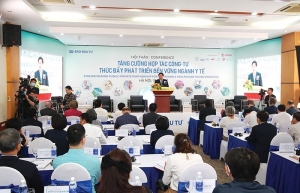Addressing reforms in Vietnam’s healthcare sector
The sector made strong efforts to fulfil the yearly targets assigned by the National Assembly (NA). Specifically, it increased the number of doctors and sickbeds to 11 and 31 per 10,000 people, respectively, and over 92 per cent of the population now have health insurance.
 |
| Dao Hong Lan, Minister of Health |
During the year, the sector also focused on policymaking, including important policies for the development of the industry. The ministry built and advised the government to submit the amended Law on Medical Examination and Treatment, the amended Law on Pharmacy, the amended Law on Health Insurance, and the Law on Sex Change as well as decrees and resolutions related to the industry.
The sector is recovering, and examination and treatment activities have gradually recovered to pre-pandemic levels. Telehealth is increasingly rolled out at medical facilities. The Ministry of Health (MoH) is also accelerating a list of related prices.
The shortage of drugs and equipment at facilities has being gradually solved. The ministry has also advised the government to issue a resolution ensuring the supply of medicines, and equipment, as well as payment of related expenses covered by health insurance.
It has also worked with the Ministry of Finance, the Ministry of Planning and Investment, Vietnam Social Insurance, and various agencies on amendments and supplementation of regulations related to the procurement of drugs, equipment, and insurance payment, while accelerating issuance of new marketing authorisations.
The sector continues to develop a network of human resource training institutions, develop professional competency standards, and standard training programmes. Policies to attract manpower have also been proposed to the government, for example on increasing preferential allowances for healthcare staff.
The MoH also implemented HIV/AIDS prevention initiatives, as well as food safety and hygiene, while enhancing administrative reform, and applying IT for digital transformation in the health sector.
At a recent meeting, the prime minister pointed out 14 groups of issues that the sector needs to focus on. Its legal system remains problematic, and incomplete, especially in procurement, socialisation, autonomy, and public hospital administration.
Worse still, health service prices are only slowly adjusted, while the state spending on healthcare and health insurance, as well as the country’s total healthcare spending per capita is still low. Household out-of-pocket spending is still high. The Health Insurance Fund at risk of imbalance due to low premiums.
Other issues include national target programmes changing their focus; staff leaving the industry, especially those with experience and qualifications in state-owned health facilities; and shortage of medicines and medical devices at health facilities nationwide. There is also a backlog of registration dossiers for circulation of drugs and medical equipment.
Although the shortfall of drugs and medical devices has been partly solved, it has not yet been fully settled. The pharmaceutical industry and manufacturing of such devices in the country remains limited.
The capacity of the health system, especially grassroots health facilities, and preventive health, is still limited. Some diseases such as hand-foot-and-mouth as well as dengue fever had an increased number of cases. The rate of expanded vaccination in some areas is not guaranteed, especially in remote areas with difficult economic conditions. The quality of administration and patient service in some medical facilities has not yet met set requirements.
Digital transformation and IT applications in the sector has not yet met the requirements set by the government in the implementation of data connection, and examination and treatment services.
In 2023, the ministry will continue to solve existing problems. Specifically, there we will be a focus on perfecting the legal framework, institutions, and draft laws. In the immediate future, the focus will be submitting to the NA the revised Law on Medical Examination and Treatment and building a system of guiding documents, as well as amending laws regarding pharmacy, population, health insurance, and others.
Other issues are to concentrate on disease prevention, innovate and improve preventative healthcare, implement the National Expanded Immunisation Programme, strengthen disease surveillance and forecasting, limit disability and premature death due to non-communicable diseases, and better manage food safety.
There must be improvements in hospital management capacity, quality of examination and treatment services, and patient service attitude. Specialised medical techniques must be developed, and traditional medicine must be enhanced. We must also closely combine traditional medicine with modern equivalents, and we must soon issue a list of techniques in related examination and treatment.
Next, it is key to gradually reform the organisational structure of the health sector in terms of streamlined efficiency and effectiveness, and develop the strategic planning for the sector, including planning for the network of medical facilities by 2030. Together, we will deploy innovative solutions to develop human resources and international integration, and propose policies to improve remuneration for staff.
We will check and review service prices are correct and solve problems and make innovations in payment methods, update preventive health financing, implement the programme of socioeconomic recovery and development, and ensure a roadmap for universal health insurance coverage alongside the payment of medical expenses with appropriate health insurance.
Finally, we will carry out administrative reform associated with IT and digital transformation, and reduce and simplify regulations related to business activities under the management of the MoH, especially in the fields of pharmaceuticals and medical equipment.
 | Navigating legal challenges in healthcare partnerships While the public-private partnership model is proved to be an optimal choice to promote funding in the healthcare sector, many issues remain in implementing this in Vietnam. Ngo Thanh Hai, Nguyen Van Tuan and Le Net, partners at LNT & Partners, offer analysis into the legal challenges and future prospects. |
 | More favourable rule system urged for healthcare PPPs A more robust legal framework is being sought to strengthen public-private partnerships in the health sector, thus increasing the system’s resilience and sustainability for better preparation for new pandemics. |
 | Key priorities for healthcare sector amid challenging time Many people have asked me why I dared to take the position as Minister of Health at this time, especially when I do not have a medical professional background. However, with the role and responsibility of a party member and especially with the trust of members of the Party Central Committee, I strictly obey the assignment of the Party and State. |
What the stars mean:
★ Poor ★ ★ Promising ★★★ Good ★★★★ Very good ★★★★★ Exceptional
Related Contents
Latest News
More News
- Masan Consumer names new deputy CEO to drive foods and beverages growth (February 23, 2026 | 20:52)
- Myriad risks ahead, but ones Vietnam can confront (February 20, 2026 | 15:02)
- Vietnam making the leap into AI and semiconductors (February 20, 2026 | 09:37)
- Funding must be activated for semiconductor success (February 20, 2026 | 09:20)
- Resilience as new benchmark for smarter infrastructure (February 19, 2026 | 20:35)
- A golden time to shine within ASEAN (February 19, 2026 | 20:22)
- Vietnam’s pivotal year for advancing sustainability (February 19, 2026 | 08:44)
- Strengthening the core role of industry and trade (February 19, 2026 | 08:35)
- Future orientations for healthcare improvements (February 19, 2026 | 08:29)
- Infrastructure orientations suitable for a new chapter (February 19, 2026 | 08:15)

 Tag:
Tag:


















 Mobile Version
Mobile Version